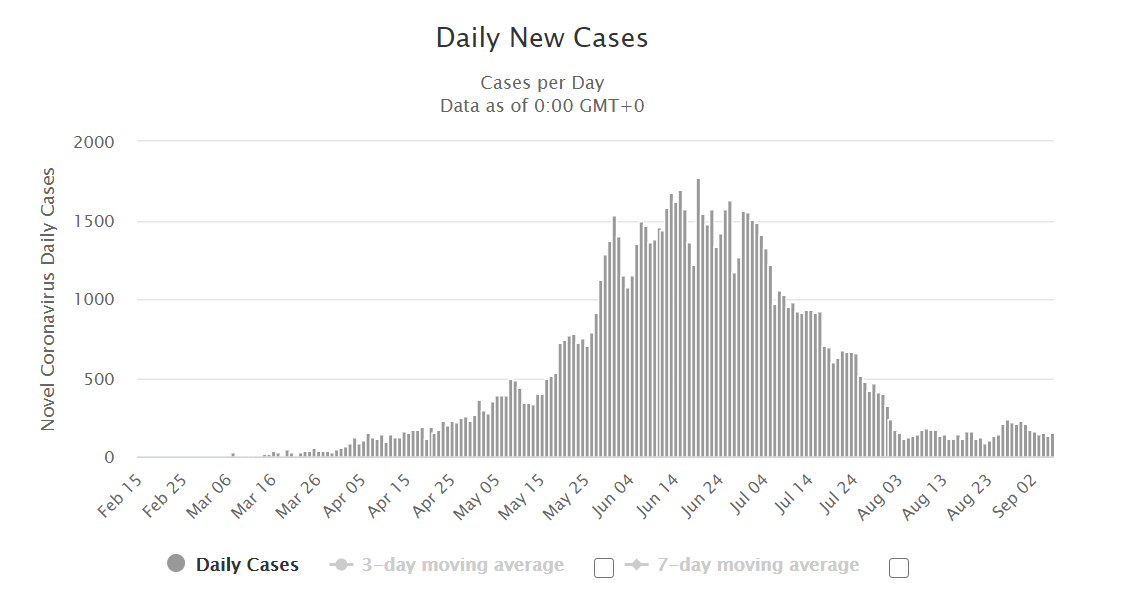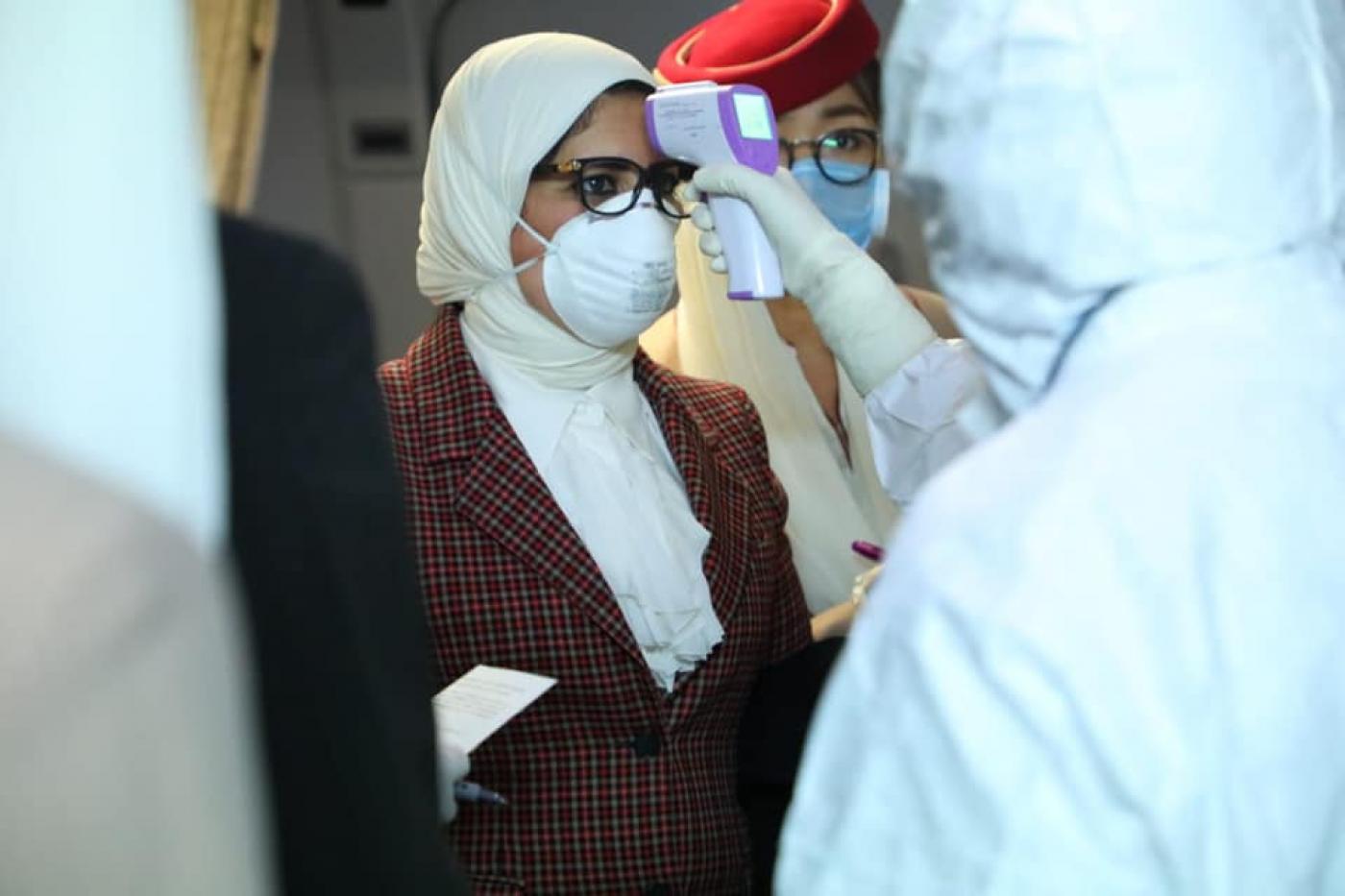Yes, numbers in Egypt may have plummeted, restaurants may have reopened, and people may no longer be obsessed with hand-washing and mask-wearing, but we are still living through a global pandemic. On 4 September, 2020, Worldometers recorded over 300,000 new cases worldwide, the highest number of infections recorded in a single day since SARS-CoV-2 first broke out.
In August, Egyptian Prime Minister Mostafa Madbouly and Health Minister Hala Zayed both warned against the danger of Egyptians being lulled into a false sense of security due to the low number of daily infections. And yet simultaneously, ‘coexistence’ with the virus in Egypt has, in practice, almost meant a full return to the pre-pandemic normal.
Egypt and the Pandemic
The truth is that Egypt’s case with the coronavirus is a curious one. From the beginning of the outbreak, numbers of cases and deaths were low, coming as a fraction of numbers recorded in countries with comparable circumstances and population sizes.
Many feared that these numbers, though on the rise, may not fully represent the spread of the virus given the limited numbers of administered tests.
The last official tally of testing numbers, made available on May 15, 2020, stands at 135,000, a small number. This is due to the fact that the tests administered both in the public as well as the private sectors are no longer being published.
Widespread anecdotal evidence from individuals as well as doctors and nurses suggested, however, that in the spring, large numbers of people were suffering from symptoms that looked uncannily like COVID-19, though tests were not always administered to confirm the presence of the virus.
Wide-reaching precautionary measures were put in place between mid-March and early April as numbers of cases began to regularly figure at over 1,000. Restaurants closed completely, shops and malls opened for a limited number of hours, and a nightly curfew was imposed.
The lockdown, which persisted through Ramadan, ended after a few final days of strict measures during Eid, while the upward trajectory of daily case numbers showed no sign of changing course. The curfew was lifted, restaurants reopened, and some workplaces resumed at least partial functioning.
At this point, the most curious course of events took place. After reaching a peak and plateauing in mid-June (less than a month after Eid), daily cases began to drop precipitously in the early days of July.

Why have numbers in Egypt fallen? Are we going to experience a second wave?
Though so far there is no established scientific explanation as to why and how this drop occurred, there have been speculations to try to make sense of lifted measures coinciding with dropping numbers, as well as the reasons why overall infection levels in Egypt were lower than other countries with similar circumstances.
Anecdotal evidence from individuals as well as doctors and nurses so far corroborates the drop, even if it does not confirm the true number of daily cases. Gatherings, celebrations, and office work has resumed, and yet hospitals appear to be seeing fewer cases admitted with suspicion of COVID-19.
On of the theories explaining this phenomenon is that vaccines for other diseases such as tuberculosis, which are no longer obligatory in Europe and the United States, but remain obligatory here, helped in developing a stronger immunity within Egyptians.
Another theory is that Egypt’s younger population (with an estimated 51.2 percent of Egyptians falling under the age of 25) has led to fewer cases being symptomatic or critical, therefore making them less impactful and harder to detect. Some are going as far as wondering whether Egyptians have already developed a herd immunity against the virus.
Some have also speculated that the strain of the virus that is spreading in Egypt is one that is weaker than the strain(s) in other parts of the world where the effect of the virus was more vicious.
Whether the weather has an effect on the spread of this virus as it does on other viruses such as influenza is as yet unconfirmed, however the sharp drop in numbers occurring in Egypt in the summer along with the rising numbers in countries where it is currently winter, suggests that it is a theory that cannot yet fully be written off.
None of these theories are definitively established, nor is there reason to believe that they are mutually exclusive, therefore none or all of these theories may be true.
Epidemiologist Abram L. Wagner writes: “There’s no strict definition for what is or is not an epidemic wave or phase. A wave implies a rising number of sick individuals, a defined peak, and then a decline. The word ‘wave’ implies a natural pattern of peaks and valleys; it hints that even during a lull, future outbreaks of disease are possible.”
Unprecedented in history, however, the drop in numbers of cases in Europe came as a result of extremely stringent lockdown measures that suppressed the spread of the coronavirus. Once these measures were relaxed numbers snapped back, showing a pattern that resembles a new wave, although not as a result of the natural cycle of the virus.
As the relaxation of measures coincided in time with the plateau and drop in daily recorded cases in Egypt, it is unlikely that the current drop is a result of the precautionary measures. That being said, it can not be directly deduced that this is the end of the coronavirus in Egypt.
What precautions should I take in this more open environment?
Egypt has reached a point of openness that makes it difficult, if not impossible, to individually impose a lockdown without any reason to assume infection. Many workplaces that had previously called for remote work are seeing employees return to their premises, while other employers are taking a more laissez-faire approach, where anyone who wants to go to the office can simply do that even if they are not obliged to.
While checking body temperature is a common practice, particularly in indoor public establishments, it is significant to remember that asymptomatic (infected individuals who do not display symptoms) and pre-symptomatic (infected individuals who have yet to display symptoms) spreads are a very common mode of transmission. Not to mention that not all those who are infected and symptomatic become feverish.
There is general consensus that wearing face-coverings and physically distancing are the best ways to protect oneself and others from infection. Scientific reports, including a World Health Organization (WHO) advisory, suggest that the main mode of transmission is the spread of respiratory droplets. Masks are effective in trapping respiratory droplets exiting through the mouth and the nose, therefore the more people wear them, the less likely it becomes for the virus to spread.
Wearing a mask not only protects the individual from potentially being infected by others, but also ensures that if they are unknowingly asymptomatic or pre-symptomatic, they are not a hazard to others they come into contact with. And wearing a face-covering means actually wearing, not carrying or having it, or letting it drop down to the chin.
The same WHO advisory suggests that there is little evidence confirming that there is significant spread through surfaces. Nevertheless, maintaining a regular hand-washing or sanitizing habit after coming into contact with surfaces is a helpful one.
Needless to say, another highly effective way of preventing the spread is to observe strict self-quarantine in the case of any symptoms associated with COVID-19.
As Egypt navigates this fraught period of risk and potentially false security, it is important to remember that it is better to be safe than sorry. Observing precautionary measures and encouraging others to do so could help prevent a new rise in cases.
As was warned by the Prime Minister and Health Minister, complacency in the face of this ferociously spreading virus could lead to disastrous consequences should Egypt witness a resurgence in infections in the future, whether that be linked to changes in the weather or any other variables.
Wearing masks and physically distancing, as well as staying home when possible and taking the outdoor alternative to any activity could have a significant impact on the spread and play a pivotal role in protecting the more vulnerable. If the current, safer circumstances are favored by all, the way to maintain them is to err on the side of caution.
Any views expressed by the writer are their own and do not reflect the views of any institution with which they are affiliated.







Comments (0)